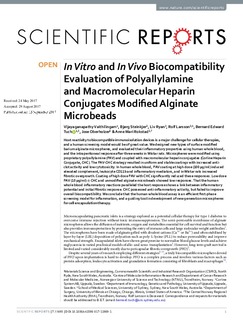| dc.contributor.author | Vaithilingam, Vijayaganapathy | |
| dc.contributor.author | Steinkjer, Bjørg | |
| dc.contributor.author | Ryan, Liv | |
| dc.contributor.author | Larsson, Rolf | |
| dc.contributor.author | Tuch, Bernard E. | |
| dc.contributor.author | Oberholzer, José | |
| dc.contributor.author | Rokstad, Anne Mari | |
| dc.date.accessioned | 2017-09-21T06:45:37Z | |
| dc.date.available | 2017-09-21T06:45:37Z | |
| dc.date.created | 2017-09-19T12:02:40Z | |
| dc.date.issued | 2017 | |
| dc.identifier.citation | Scientific Reports. 2017, 7 (11695), 1-15. | nb_NO |
| dc.identifier.issn | 2045-2322 | |
| dc.identifier.uri | http://hdl.handle.net/11250/2455870 | |
| dc.description.abstract | Host reactivity to biocompatible immunoisolation devices is a major challenge for cellular therapies, and a human screening model would be of great value. We designed new types of surface modified barium alginate microspheres, and evaluated their inflammatory properties using human whole blood, and the intraperitoneal response after three weeks in Wistar rats. Microspheres were modified using proprietary polyallylamine (PAV) and coupled with macromolecular heparin conjugates (Corline Heparin Conjugate, CHC). The PAV-CHC strategy resulted in uniform and stable coatings with increased anti-clot activity and low cytotoxicity. In human whole blood, PAV coating at high dose (100 µg/ml) induced elevated complement, leukocyte CD11b and inflammatory mediators, and in Wistar rats increased fibrotic overgrowth. Coating of high dose PAV with CHC significantly reduced these responses. Low dose PAV (10 µg/ml) ± CHC and unmodified alginate microbeads showed low responses. That the human whole blood inflammatory reactions paralleled the host response shows a link between inflammatory potential and initial fibrotic response. CHC possessed anti-inflammatory activity, but failed to improve overall biocompatibility. We conclude that the human whole blood assay is an efficient first-phase screening model for inflammation, and a guiding tool in development of new generation microspheres for cell encapsulation therapy. | nb_NO |
| dc.language.iso | eng | nb_NO |
| dc.publisher | Nature Publishing Group | nb_NO |
| dc.rights | Navngivelse 4.0 Internasjonal | * |
| dc.rights.uri | http://creativecommons.org/licenses/by/4.0/deed.no | * |
| dc.title | In Vitro and In Vivo Biocompatibility Evaluation of Polyallylamine and Macromolecular Heparin Conjugates Modified Alginate Microbeads | nb_NO |
| dc.type | Journal article | nb_NO |
| dc.type | Peer reviewed | nb_NO |
| dc.description.version | publishedVersion | nb_NO |
| dc.source.pagenumber | 1-15 | nb_NO |
| dc.source.volume | 7 | nb_NO |
| dc.source.journal | Scientific Reports | nb_NO |
| dc.source.issue | 11695 | nb_NO |
| dc.identifier.doi | 10.1038/s41598-017-11989-1 | |
| dc.identifier.cristin | 1495308 | |
| dc.description.localcode | This article is licensed under a Creative Commons Attribution 4.0 International License, which permits use, sharing, adaptation, distribution and reproduction in any medium or format, as long as you give appropriate credit to the original author(s) and the source, provide a link to the Creative Commons license, and indicate if changes were made. The images or other third party material in this article are included in the article’s Creative Commons license, unless indicated otherwise in a credit line to the material. If material is not included in the article’s Creative Commons license and your intended use is not permitted by statutory regulation or exceeds the permitted use, you will need to obtain permission directly from the copyright holder. To view a copy of this license, visit http://creativecommons.org/licenses/by/4.0/. | nb_NO |
| cristin.unitcode | 194,65,15,0 | |
| cristin.unitcode | 194,65,15,30 | |
| cristin.unitname | Institutt for kreftforskning og molekylær medisin | |
| cristin.unitname | Centre of Molecular Inflammation Research (SFF-CEMIR) | |
| cristin.ispublished | true | |
| cristin.fulltext | original | |
| cristin.qualitycode | 1 | |

